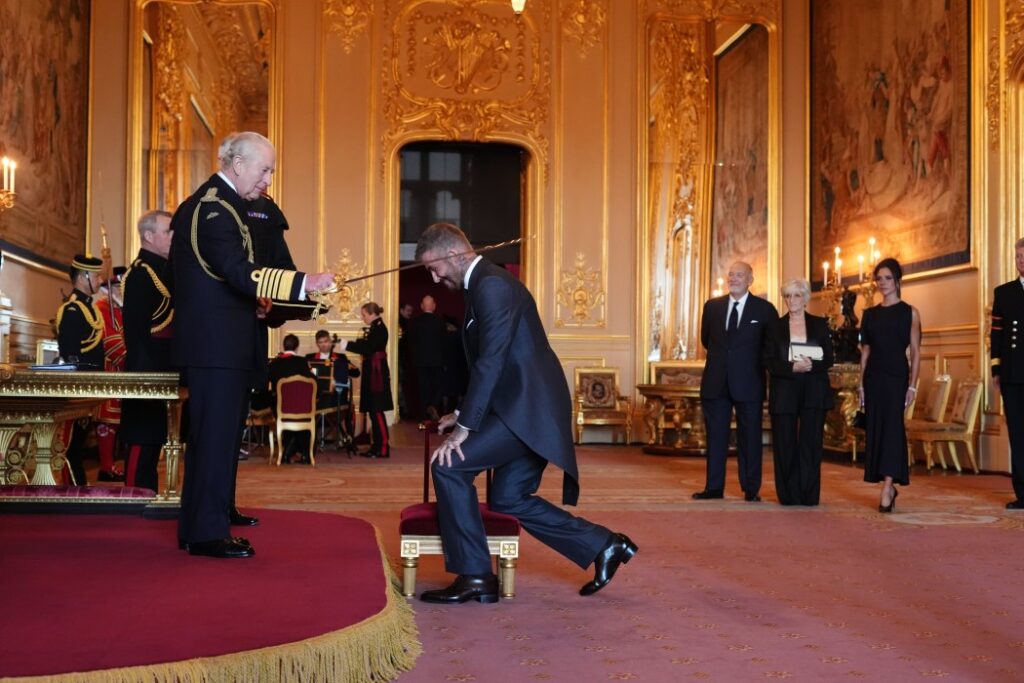David Beckham & the Return of the Modern Knight
November 6, 2025
Michael Pirrie looks at what David Beckham’s knighthood means; the man behind the myth and his key but under recognized role in helping London to win the Olympic Games, an important factor in his new honour.
Spectators were speaking almost as one in thousands of discrete conversations across Stratford in east London as I was leaving the Olympic Stadium at the end of Danny Boyle’s epic Olympic Games Opening Ceremony in 2012, remarking in hushed tones: “I have never felt so proud to be British.”
The cavalcade of the surreal ‘feel-proud’ ceremony scenes included Sir David Beckham accompanying the Olympic torch on a speed boat down the River Thames, destined for the stadium to commence the segment that would ignite the iconic Olympic cauldron and open the Games.
The choice of torch carrier to escort the famous light sabre in the one of the final momentous scenes of the ceremony, safeguarding the passage of the torch and the Olympic dreams it symbolised was a priority selection.
This required a guardian with a special presence and aura who embodied the essence of the flame as well as the London Games, and who could be trusted in one of the biggest moments in recent British history to execute and deliver when it counted the most.
With billions watching on globally there was no margin for error, and it should perhaps have come as no surprise that David Beckham was chosen for this moment – just as he has delivered in so many other major moments
Beckham’s royal moment earlier this week was also a fairytale like ceremony as he knelt before his King
This was another ceremony that made Britain proud; a moment also of fantasy and wonder in deeply divided and tumultuous times
There were no banners or battlements; no trumpets. Just a man and a monarch.
Yet as the King’s sword touched Beckham’s shoulder, something older than either of them seemed to stir – the memory perhaps even of King Arthur and his realm of Round Table Knights.
Beckham’s reference to wife Victoria as “My Lady” even conjured ghosts of Camelot
What this ceremony perhaps conjured most was the idea that honour still can still have meaning.
In the old days, the knights defended the weak which Beckham has helped to do – not with a sword but with service; not in armour but in kindness.
His significant funding of charities has assisted those who are helpless and dependent on charity sector.
Chivalry was also central to the code of conduct of the Round Table Knights.
Like Beckham. When Britain came to say farewell to its Queen, he queued with the people for thirteen long hours, shoulder by shoulder. This is perhaps where chivalry lives now – not in legend but in line
They say Beckham could bend a ball through the air like a prayer. If so, his knighthood was perhaps the answer to a personal prayer and honour he has long harboured.
Perhaps what Beckham has also truly bent is time, his knighthood coming long after many expected the honour to come – 20 years ago following his key role in bringing the Olympic Games to London.
While Beckham carried England and Manchester United on his boots, the London Olympics has transformed sport in the UK more than any of his own football feats.
Beckham has championed the causes of King and country and before that his Queen, especially the Olympic bid, a project close to the late Queen Elizabeth 11 and Royal Family.
The knighthood sees Beckham joined in rank with his late legendary Manchester United hero, Sir Bobby, who also played a key role in the London bid.
The knighthood further enhances the Beckham aura, brand and mythology, making it more difficult perhaps to distil the essence of Beckham – in reality if not a bottle.
We saw Beckham’s commitment, empathy and understanding of how big picture causes and projects that can help his country, young people and others through his role as ambassador on the Olympic bid.
Beckham was committed and had become a true believer in London’s bid. As a global superstar he understood the international environment of elite sport like few others and how his involvement in our bid campaign could advance the cause – and his legacy.
The outcome of the London Olympic campaign had become deeply personal for him, and his presence in Singapore for the IOC’s host city decision had a pivotal impact, which is perhaps still not fully recognised.
As well generating international attention and keeping the spotlight on London in the final few days of the contest, Beckham brought enormous credibility to our bid.
As a global football and fashion icon of youth culture and sport, Beckham, in particular, embodied London’s vision to inspire young people
As one of our original ambassadors Beckham had a strong knowledge and understanding of our bid and could talk comfortably and passionately to media and other key influential IOC audiences about London in ways that high profile representative from other bids struggled to do.
He was fully and personally invested. While Beckham was part of our final presentation to the IOC, he had initially planned to fly out of Singapore later that evening with his wife but later asked if he could stay with the bid team to hear the final host city vote by IOC members.
Beckham has fought his own family battles, red cards and redemption; he has experienced grief and glory and won not be force but by grace and resilience. For a fleeting moment earlier this week, King Arthur’s Round Rable was whole again as Beckham reminded the world what England still means.


